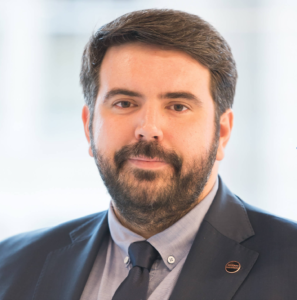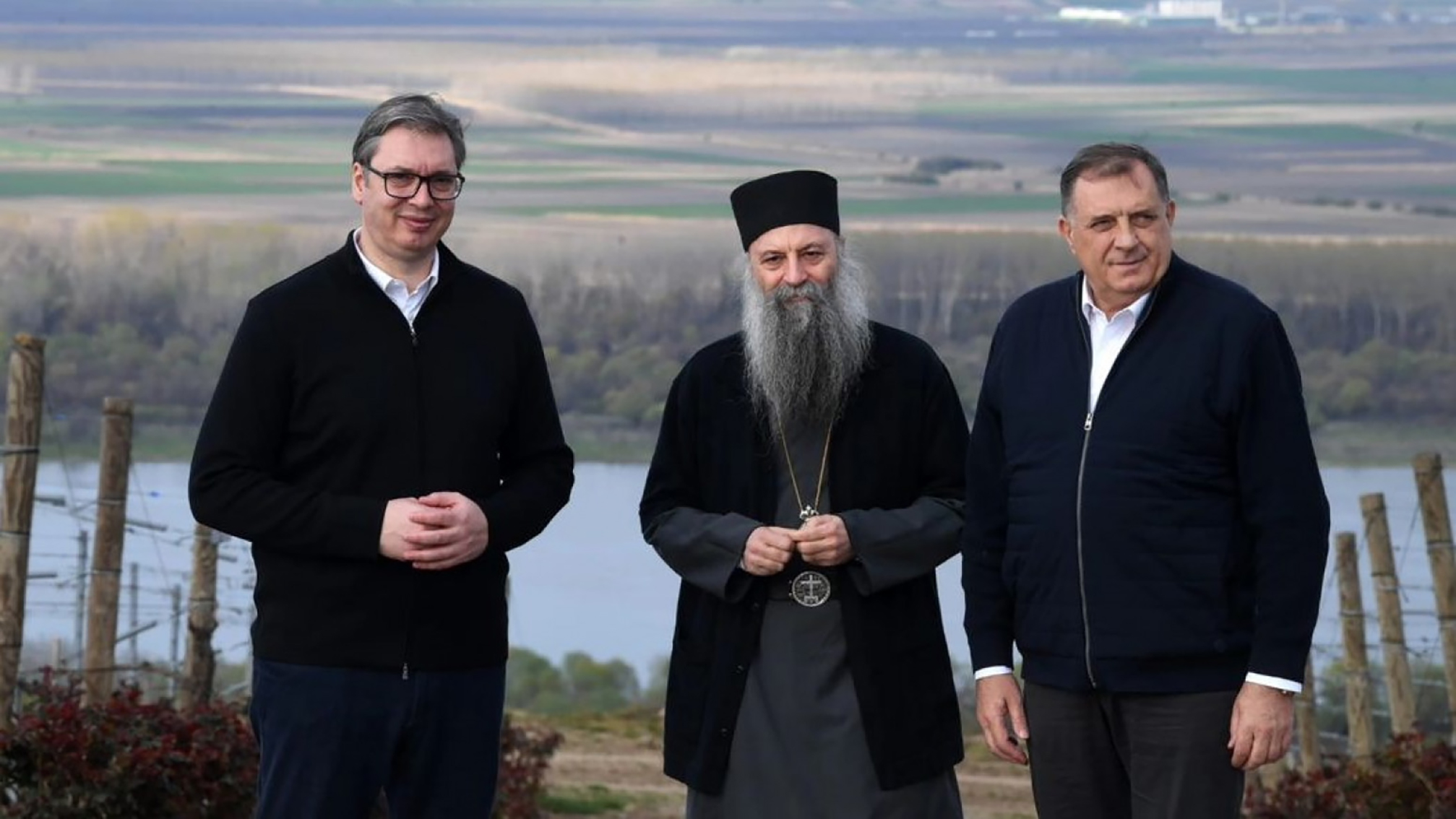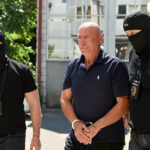Following “hours of discussions” in mid-March between Serbian President Aleksandar Vučić and the President of the Bosnian-Herzegovinian entity Republic of Srpska, Milorad Dodik, in the presence of Serbian Patriarch Porfirije, a grand Easter Sabor (Assembly) of Serbia and Republic of Srpska has been announced. It will take place on Orthodox Easter, which falls this year just before the celebration of St. George’s Day,
In his characteristic style, the Serbian President announced that the assembly would pass decisions on “important matters regarding the survival of the Serbian people in their homelands, its economic progress, preservation of the Serbian language and Cyrillic script, and shared cultural heritage.”
Aleksandar Vučić never misses an opportunity to create drama around both minor and major issues. What external observers often overlook is that his regional and international activities must always factor in the internal political dynamics in Serbia. Serbia is currently in the midst of a pre-election campaign for the elections in the capital city of Belgrade after last year’s elections left political entities in a deadlock where forming local government in the capital was impossible. Belgrade is important not just symbolically as a capital, but for its size too, as it is home to 20 percent of the Serbian population. Moreover, a change of government in Belgrade could potentially trigger a domino effect throughout Serbia, similar to what happened in the 1990s when a change in Belgrade preceded the regime change at the national level.
Authoritarian regimes worldwide have a fairly synchronized playbook when it comes to activities authoritarian leaders are willing to undertake to maintain power: pressuring the media and civil society, intimidation, national and ethnic homogenization, undermining the rights of minority communities, and in extreme cases, provoking armed conflict. Milošević’s and Putin’s regimes serve as predecessors and models for Vučić’s system in this regard. It’s important not to forget that the current Serbian President was the Minister of Propaganda during Milošević’s regime.
In this light, the announcement of this event, whose preparations have been ongoing for the past few years, should be viewed through campaigns related to the promotion of the “Serbian World,” such as the unsuccessful Serbian Flag Day celebrated in September each year.
The Original All-Serbian Assembly
The lyrics of the song “Sloboda” by the popular Zagreb band Azra from the 1980s say “Those who do not remember, come to live through it again” Therefore, those who do not remember the 1980s might think that there is something new in these moves by Vučić and Dodik, when in fact it’s just an echo of the great “happenings of the people” from the late 1980s. The campaign of “Serbian awakening,” which culminated in wars and the dissolution of Yugoslavia.
The culmination was precisely the event that probably serves as a model for Vučić for this year’s Easter Sabor – the grand Gazimestan Assembly of 1989 where Milošević put an end to the existence of the SFRY.
After the death of Josip Broz Tito, Yugoslavia plunged into a political and financial crisis. Debts for the expensive welfare state and the self-managed socialist system came due, and Titoism as a cohesive factor did not outlive the Yugoslav dictator. The slogan “even after Tito, Tito” remained hanging in the air.
The first sparks broke out in Kosovo, and Serbia responded vigorously. After going to Kosovo, Milošević was perceived as the messiah of the Serbian national movement, which prompted him to stage a coup within the Serbian Communist Party, during which the former leader Ivan Stambolić was removed, whom Milošević’s secret police later assassinated before the 2000 elections.
With the help of the Serbian Academy of Sciences and Arts and the Serbian Orthodox Church, a campaign of “Serbian revival” was launched, and a series of events and demonstrations were initiated, leading to coups within the communist parties of Vojvodina, Kosovo, and Montenegro. Everything culminated in the gathering of hundreds of thousands of people at Gazimestan, the site of the Battle of Kosovo, to mark its six-hundredth anniversary. The Kosovo myth occupies an important place in Serbian national mythology, and the mobilization potential of this event led Serbia to fairly confidently approach other republics of the SFRY with a demand for redefining the relations within the country, in which, according to Milošević’s vision at the time, Serbia should occupy the “place it deserves,” i.e., a central and dominant role in Yugoslavia. As this did not suit others and as Milošević was ready for it, the project of a small Yugoslavia or a great Serbia, where all Serbs would live, was launched. This project led to bloody wars in the territory of the former Yugoslavia, the disintegration of the country, and the complete isolation of Serbia and Montenegro.
All-Russian Assembly as a Model
Whether it’s synchronicity, the zeitgeist, or coordination, it cannot be definitively asserted, but the models of the Russian World and Greater Serbia simultaneously exist and coexist with many parallel and analogous overlaps in design and internal dynamics.
What is happening in Ukraine now seems to be a belated chain reaction compared to what happened in Yugoslavia.
In the Soviet Union, the first problems also started on the periphery. The first protests erupted in Kazakhstan as a result of ethnic tensions. The tragedy in Tbilisi in April 1989, as well as the ethnic tensions around Nagorno-Karabakh, demanded a response from the central authorities in Moscow.
Like the “people’s events” and the 600th anniversary of the Battle of Kosovo, in Russia, a mass event commemorating the millennium of the Baptism of the Rus was initiated in 1988. However, due to the boycott of Constantinople, as well as the modest support from the state, this campaign did not have a significant effect on the national and ethnic homogenization of what Russian nationalism considers a single Russian ethnic space (Belarus, Russia, and Ukraine). However, in 1993, the Russian Orthodox Church, at the idea of the current Patriarch Kirill, who was then the Metropolitan of Smolensk and Kaliningrad of the Russian Orthodox Church, formed the World Assembly of Rus, as a response to the “difficult period of national history, when the Russian people needed unity.” This is stated on the Assembly’s website under the section “About Us,” and it also states the following: “Russians have lived for centuries in the territory of one country and have been united by common statehood and common spiritual values. Since 1991, Russians have become a divided people…” It sounds familiar. At the last World Assembly, at the end of March, Russian Patriarch Kirill stated that a “holy war” is being waged in Ukraine.
All-Serbian Assembly
Although Vučić, after the aforementioned meeting with Dodik “in the presence of Patriarch Porfirije,” announced the Assembly of Serbia and Republic of Srpska, Milorad Dodik recently said that the assembly would be expanded to the region: “The Assembly would bring together the political elite of Srpska and Serbia, political representatives of Montenegro, Kosovo, the diaspora. It would involve the academies of sciences of Srpska and Serbia, and even the academics of sciences of Montenegro that want to participate, representatives of the Serbian Orthodox Church.”
The Serbian propagandist, director, and former paramilitary volunteer Dragoslav Bokan spoke for the Russian propaganda RT, confirming a broader All-Serbian agenda of gathering, calling this event part of a broader defense “if there is a separate attack on the Republic of Srpska, and then weaken Serbia and return of Montenegro to Montenegrinism – then we are done, because then they will disintegrate us, as they are already trying to do.”
From Montenegro, Milan Knežević, the leader of the pro-Russian Serbian DNP, which is one of the leaders in the parliamentary majority soon to enter the government, spoke out. He said on the network “X”: “The only response to attempts to genocide the Serbian people, seize Kosovo, chip away at our history, lose our identity, is the Assembly”.
The Serbian parliamentary opposition will not participate in this gathering. Opposition MP and one of its leaders Pavle Grbović reacted critically: “The fact is that every time the SNS government finds itself in difficult circumstances – and they are currently numerous, given that it is a regime caught in election theft (…) and faces the complete halt of European integration and European funds, they resort to pseudo-patriotic wild card and creating an atmosphere on the brink of conflict and incident, where the measurement of these patriotic bloodlines is carried out again, where the famous unity is again created following Putin’s model of governance.”
Civil society also reacted. Sonja Biserko from the Serbian Helsinki Committee told Voice of America: “He [Vučić] is organizing this based on the idea of unity; the ‘Serbian world’ is manifested through his frequent meetings with Dodik and Porfirije,” says Biserko and assesses that it is based on expectations that international circumstances will change – “Putin’s victory, Trump’s victory is expected… So they are constantly monitoring events in the broader international context expecting the tide to turn in their favor. And from there, Vučić’s vacillation, balancing all the time is based on those assessments, perceptions, or expectations.”
All in all, the assembly and its scope should, by all indications, remain limited in reach and intention to mobilize a critical mass for any regional conflict. Vučić’s regime is not capable of that. What could be successful is the internal party homogenization of Vučić’s SNS and the ruling coalition, although even that remains questionable.
The articles published in the “Opinions” column reflect the personal opinion of the author and may not coincide with the position of the Center
Ljubomir Filipović. Montenegrin political scientist




